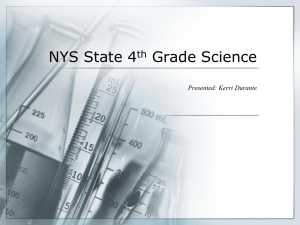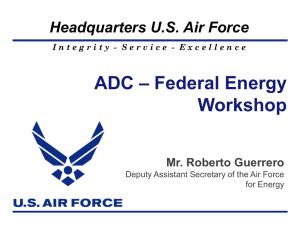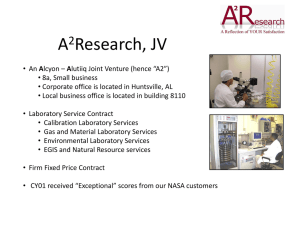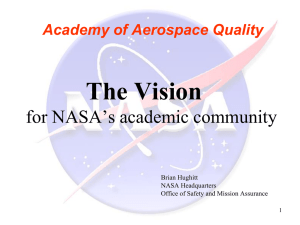Ron Sega, USAF, Ret & Astronaut
advertisement
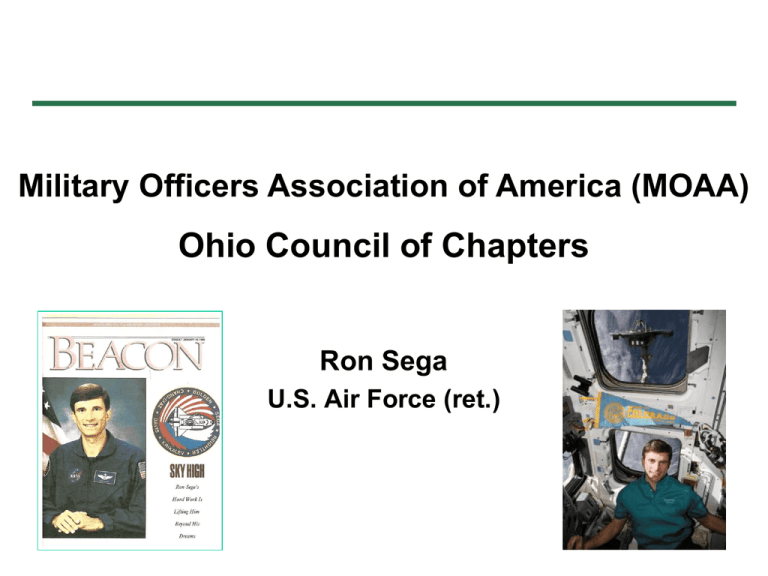
Military Officers Association of America (MOAA) Ohio Council of Chapters Ron Sega U.S. Air Force (ret.) Sputnik October 4, 1957 Yuri Gagarin Mercury Gemini Apollo Apollo-Soyuz Space Shuttle - Discovery 901 TAG and 302 TAW (1982-1987) Test Flight – May 26, 2010 Photos from 910 AW website 9 STS-60 Space Shuttle Discovery 1994 Source: http://science.ksc.nasa.gov/gallery/photos/1996/high/KSC-96PC-2961.10.jpg Source: http://science.ksc.nasa.gov/gallery/photos/1995/high/KSC-95PC-0969.jpg Source: http://science.ksc.nasa.gov/shuttle/missions/sts-60/sts-60-patch.jpg Source: http://images.jsc.nasa.gov/luceneweb/fullimage.jsp?searchpage=true&keywords=wake&textsearc h=Go&hitsperpage=5&pageno=3&photoId=STS060-74-054 Source: http://spaceflight.nasa.gov/gallery/images/shuttle/sts-69/hires/sts069-723-072.jpg Source: http://images.jsc.nasa.gov/luceneweb/fullimage.jsp?searchpage=true&keywords =wake&textsearch=Go&hitsperpage=5&pageno=2&photoId=STS060-54-018 Source: http://images.jsc.nasa.gov/lucene web/fullimage.jsp?searchpage=tru e&keywords=wake&textsearch=G o&hitsperpage=5&pageno=3&phot oId=STS060-57-033 Source: http://images.jsc.nasa.gov/luceneweb /fullimage.jsp?searchpage=true&key words=wake&textsearch=Go&hitsper page=5&pageno=2&photoId=STS06 0-09-024 Source: http://spaceflight1.nasa.gov/gallery/images/shuttle/sts-69/hires/sts069-732-048.jpg Source: http://spaceflight1.nasa.gov/gallery/images/shuttle/sts-69/hires/sts069-724-095.jpg STS-76 Space Shuttle Atlantis to Mir 1996 International Space Station Director of Defense Research and Engineering, Department of Defense Three Areas of Increased Emphasis National Aerospace Initiative Surveillance and Knowledge Systems Energy and Power Technologies Technical Systems Reviews Technology Readiness Assessments Task Force support to Systems Development Workforce Initiative DUSD (Laboratories and Basic Sciences) National Defense Education Program (NDEP) 37 Hypersonics -- X-51A Test Flight – May 26, 2010 38 Energy & Power Technologies… - Enabling a More Electric Force POWER GENERATION • Fuel Cells & Fuel Reforming • Novel Power ENERGY STORAGE • Batteries • Capacitors FUEL CELL Electric Warship Space Based Radar High Power Microwave POWER CONTROL AND DISTRIBUTION • Switching & Conditioning • Power Transmission & Distribution • Thermal Management More Electric Aircraft FY02 FY12 New Operational Capabilities Electric/Hybrid Weapons Warrior Hybrid/Electric Combat Vehicle 39 Under Secretary of the Air Force Space Department of Defense Executive Agent for Space Back to Basics in Acquisition and the Block Approach Systems Engineering Workforce Research and Development Alignment with Needs and Redistribution of Risk Stability in Basic Research Energy “Make Energy a Consideration in All We Do” Energy Strategy (Supply and Demand – with Metrics) Acquisition Stages—Block Approach - GPS III Example IIIA System Development Science & Technology Block 3 Block 2 Spot Beam Block 3 Block 3 Block 4 Block 4 Block 5 Block 5 Block 6 Block 5 Block 6 Clocks Block 4 Block 4 Cross Links Development Technology IIIC Block 2 Block 1 Production Systems IIIB Block 7 Space Test Program-1 Launch Tactical Satellite Experiment-2 (TacSat-2) Successful Launch, 16 Dec 06 Ground Terminal – China Lake Capability: • Field tasking/data downlink in same pass • One meter tactical imagery • Specific emitter ID & geolocation • Dynamic retasking • Autonomous tasking/checkout/on-orbit maintenance, on-board data processing • Total mission cost w/ launch ~$63M Notes: First Image, Pacific Ocean • First of TACSAT series on-orbit • Utilized the Minotaur launch vehicle • Launched from Wallops Island Facility • Successfully commanded spacecraft from China Lake ground station Air Force Energy Strategy - Addressing Supply & Demand “Make Energy a Consideration in All We Do” Accelerate development and use of “Alternative” sources Synthetic Fuel for Aviation Renewable Energy for Installations Enhance energy efficiency -- aviation and infrastructure Promote a culture where Airmen conserve energy 44 Air Force Energy Use (as Percentage of Cost) Facility 18% Fighter 20% Bomber 8% Trainer 3% Ground 2% “Other” 7% Aviation Mobility 42% A $10/BBL INCREASE IN THE COST OF CRUDE OIL DRIVES A ~$600M/YR INCREASE IN THE COST TO AF OPERATIONS Source: DESC FY06 Cost Data Fuels Enterprise System & Defense Utility Reporting System 45 Air Force Energy Strategy Oversight Structure Senior Focus Group Infrastructure WG Acquisition & Tech WG Aviation Operations WG Critical Infrastructure Program WG Synthetic Fuels WG Innovative Financing Working Group Strategic Outreach Working Group 46 Examples of Air Force Energy Initiatives in the United States Demonstrate H2 Production & Military Fuel Cell Vehicle Grand Forks AFB, ND Synthetic Fuels Research, Air Force Research Lab, WPAFB, OH Fuel Cell/Electric Warehouse Tractor Selfridge ANGB, MI 14MW Photovoltaic generation, Nellis AFB, NV B-52 SynFuel Flight Demo, Edwards AFB, CA Wind generation farm, FE Warren AFB, WY Low Speed Vehicles Shaw AFB, SC 122 KW Photovoltaic project, Luke AFB, AZ Waste energy and ice plant, Dyess AFB, TX Demonstration Sites Advanced Power Technology Office, Robins AFB, GA Air Force Energy Office, Tyndall AFB, FL Center of Excellence 47 Synthetic Fuel Blend Engine Run (AFRL) 48 B-52 Initial Flight Test of Synthetic Fuel/JP-8 Blend—Flight Crew (September 2006) 49 United Airlines / Rentech Engineering Validation Flight - April 30, 2010 (Colorado) RenJet Fuel Loading Education / Workforce Initiatives National Defense Education Act -- 1958 Office of Science and Technology Policy (OSTP) Study National Defense Education Program (NDEP) NAS Study: Rising Above the Gathering Storm MOAA Educational Foundation The MOAA Scholarship Fund Interest-Free Loan and Grant Program The American Patriot Scholarship Systems Engineering Trend toward increasing complexity of systems Needs of industry and government Aerospace, Energy, Environment, Health Care, etc. National Surveys Colorado Industry and Government Surveys Systems engineering education at CSU Undergraduate emphasis on systems approach Master of Engineering in Systems Engineering began in the Fall 0f 2008 M.S. and Ph.D. in Systems Engineering with an emphasize Energy Systems began in the Fall of 2010 52 Challenges mentioned most as keys to our energy future: • Create breakthroughs in approaches to integrating complex energy systems • Improve the energy efficiency of buildings • Improve battery and grid level storage of energy • Advance development of renewable energy sources • Develop energy-efficient biofuels without compromising food production • Deploy cost-effective clean coal technology • Make development of shale energy sources more sustainable • Develop commercially viable nuclear fission and fusion • Increase access to sufficient clean water to meet energy needs • Implement a national energy policy Test Beds and National Energy Policy Develop university-level centers and campus-level test beds to address industry problems Create environments for innovation Contribute to National Energy Policy by offering key theoretical and empirical inputs to policy development Concluding Thoughts “We owe our current prosperity, security, and good health to the investments of past generations, and we are obliged to renew those commitments in education, research, and innovation policies to ensure that the American people continue to benefit from the remarkable opportunities provided by the rapid development of the global economy and it’s not inconsiderable underpinning in science and technology.” Reference: Rising Above The Gathering Storm: Energizing and Employing America for a Brighter Economic Future, National Academy of Sciences, 2005 55 We Are All In This Together 56
